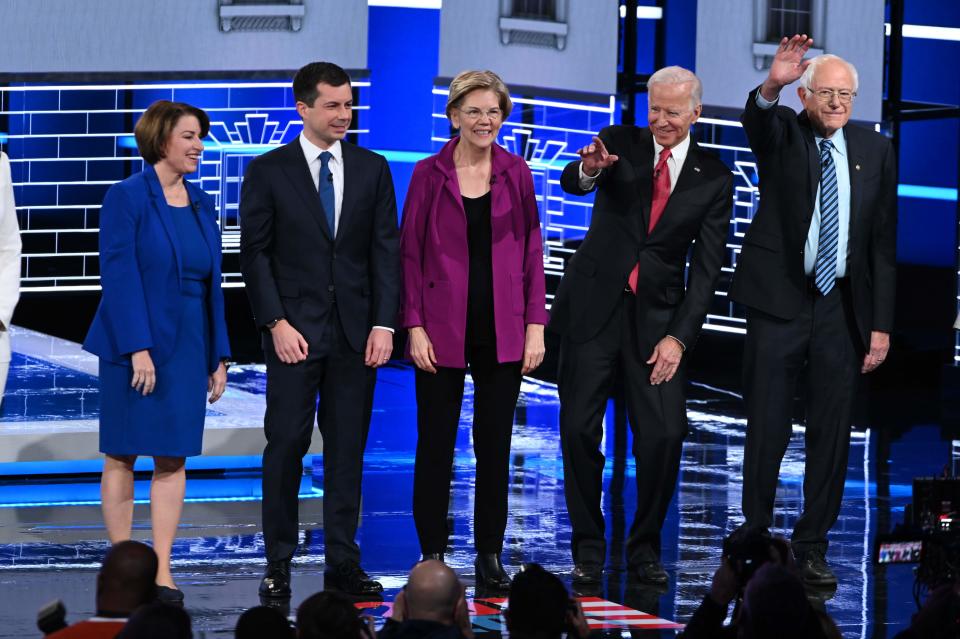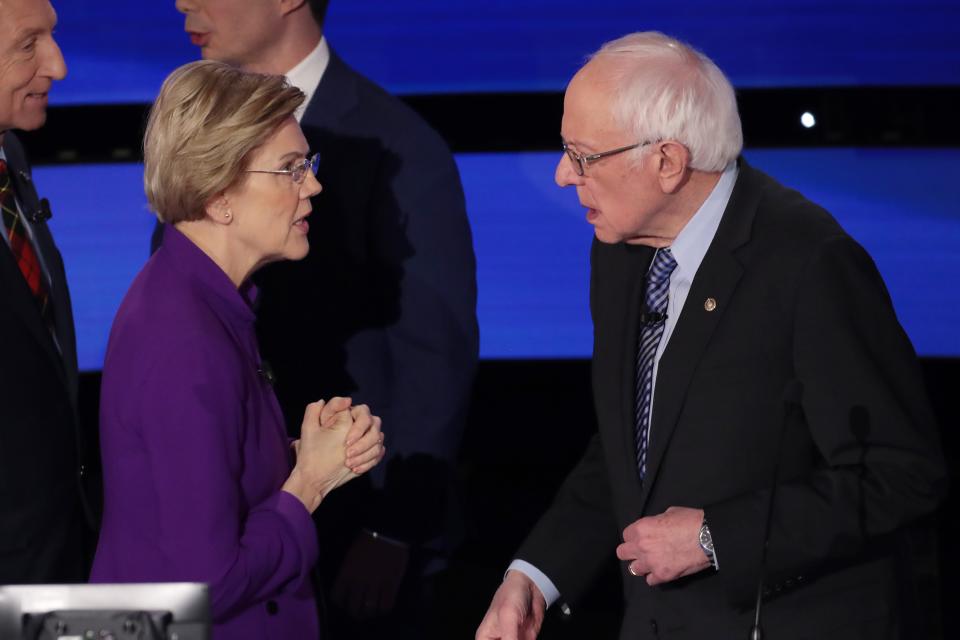USA TODAY/Ipsos poll: Is the USA ready to elect a woman president? Fewer Americans say 'yes'
Though a majority of Americans say the USA is ready to elect a female president, that number has dropped over the past six months, a national USA TODAY/Ipsos Poll shows – a sobering finding for Democratic presidential hopefuls Elizabeth Warren and Amy Klobuchar as the nominating season officially kicks off Monday in Iowa.
Seventy-one percent say they personally would be comfortable with a female president, but just 33% say their neighbors would be – a telling and perhaps more candid measure, and one that had dipped by 4 points since the poll in August.
Warren has tackled head-on suggestions that she's not electable.
"This can't be a hidden question," the Massachusetts senator said during a campaign swing in Iowa Sunday, noting that she is the only contender in the race who has defeated an incumbent Republican in the past 30 years. "I'm glad to talk about it right up front. Because, you know, women win."
In all, 56% of Americans and 68% of likely Democratic primary voters say the nation is ready to elect a woman as president, 7 percentage points lower for each than six months ago. Since then, the Democratic race has been roiled by a debate over which candidate would have the best chance of defeating President Donald Trump in November.
Candidates on the issues: Voter's guide to where they stand on health care, gun control and more

In 2016, former Secretary of State Hillary Clinton made history when the Democratic Party nominated her to be its candidate for president, the first woman to be the standard bearer for a major party. Though Trump won the Electoral College – and the election – by 74 electoral votes, Clinton won the popular vote by 2.8 million.
Iowa opens presidential season
The Iowa caucuses open a rapid-fire presidential season Monday, followed by the New Hampshire primary eight days later and early contests in Nevada and South Carolina. Former Vice President Joe Biden's campaign pitch has emphasized his strength in a general election, and Warren and Vermont Sen. Bernie Sanders skirmished over “electability” in the last Democratic debate.
Warren counts on a strong showing from her muscular grassroots organization in Iowa to stay in the top tier of candidates. Minnesota Sen. Klobuchar hopes to do well enough in her neighboring state to give her traction to stay in the race.
"I like Amy Klobuchar; I like Elizabeth Warren. I'm just not sure if they can beat (Trump)," says Sharon O'Donnell, 69, a Democrat and retired math professor in Chicago who participated in the survey. She worries that voters have trouble conceptualizing a female president because it's unfamiliar. "It's this idea, 'Oh, who would be the first lady if it was a woman?' That's part of it."
The survey found some qualms about the electoral appeal of candidates over 75 (including Joe Biden and Bernie Sanders), for those who are gay (Pete Buttigieg) and for those who are democratic socialists (Sanders).
Even so, gender looms as a hurdle.
Suffolk University/USA TODAY Poll: A week before the caucuses, Biden leads an unsettled Iowa race
Fifty percent of likely Democratic primary voters in the new poll predict that a woman would have a harder time than a man running against Trump.
In a Suffolk University/USA TODAY Poll this month, likely Democratic caucusgoers overwhelmingly chose "defeating Donald Trump" as the most important issue affecting their vote, more than health care, climate change or any other concerns.
A 'perfect candidate' against Trump?
“Our latest USA TODAY/Ipsos poll shows that Americans are more pessimistic about the country being ready for a woman president compared to six months ago,” says Cliff Young, president of research company Ipsos. “However, Democrats appear to be concerned about some facet of virtually all of the contenders as they search for a perfect candidate to take on President Trump.”
The online poll of 2,011 adults, taken Friday through Tuesday, has a credibility interval, akin to a margin of error, of plus or minus 2.5 points. The sample of 822 likely Democratic primary voters has a credibility interval of 3.9 points.
Likely Democratic voters express concerns that the personal characteristics of some candidates might make them less favorable to the electorate.
By an overwhelming 14-1, both Americans in general and likely Democratic primary voters in particular say being older than 75 makes a candidate less appealing rather than more appealing. (About a third in each category say it doesn't make a difference.) Biden is 77, and Sanders is 78.
By nearly 5-1, Americans say being gay makes a candidate less appealing. Likely Democratic primary voters agree by 3-1. Being a gay man makes a candidate less appealing, according to 32% of Americans and 23% of Democratic voters. (Half of Americans and two-thirds of the Democratic voters say it doesn't make a difference.) Buttigieg, the former mayor of South Bend, Indiana, is openly gay.
By 3-1, Americans say being a democratic socialist makes a candidate less appealing, although likely Democratic primary voters split about evenly; by 28%-24%, they call it less appealing. (Twenty-nine percent of Americans and 39% of the Democratic voters say it doesn't make a difference.) Sanders identifies himself as a democratic socialist.
For a candidate who is a democratic socialist, "it depends on how far you want to go in spending other people's money," says Logan Hutchison, 65, a retiree in Fort Madison, Iowa, who is an independent. "They don't want somebody to take 90% of their money and give it to somebody who isn't really trying. These freebies aren't free. The taxpayer is paying for it."
More than 6 in 10 of those surveyed say that being a woman doesn't affect the appeal of a candidate. For those who say it makes a difference, Americans split about evenly over whether it makes a contender more or less appealing. Likely Democratic primary voters say by 2-1 that it makes a candidate more appealing.
Who can make hard decisions?
That said, likely Democratic primary voters rate Biden and Sanders more highly than Warren on some characteristics that many see as important in a president. Both men are seen as better able to stand up to Trump, better able to make hard decisions and more approachable.

Asked which contender has the best chance to beat Trump, 29% say Biden, a drop of 8 points since the survey in August; 21% say Sanders, a rise of 1 point; and 16% say former New York Mayor Michael Bloomberg, who wasn't a candidate when the previous poll was taken. Twelve percent say Warren, down 4 points in six months.
"I'm sure at some point there'll be a female that gets elected president," says Mark Morrison, 37, public safety dispatcher in Stafford, Connecticut. A registered Democrat, he voted for Trump in 2016 and “absolutely” plans to vote for him in 2020. "We just haven't had any who have run that would be capable of running the country."
Contributing: Brianne Pfannenstiel in Iowa
On the ballot: Who is running for president in 2020? An interactive guide
Why is Iowa first?A brief history of the state's caucuses
This article originally appeared on USA TODAY: 2020 election: Majority say yes to woman president, want to beat Trump

